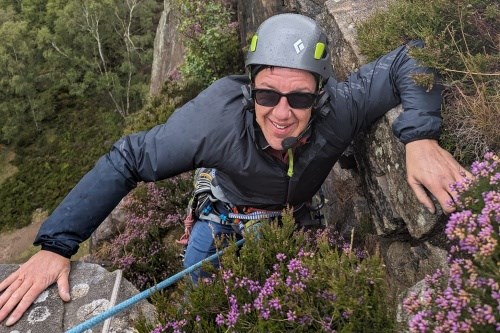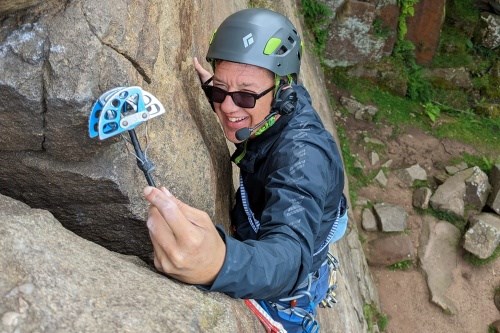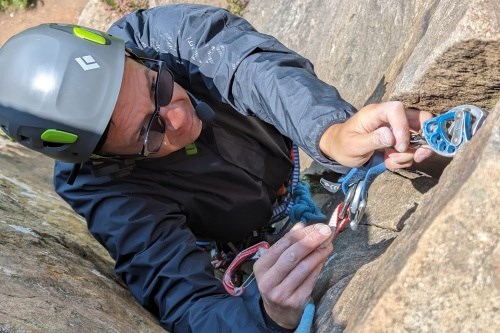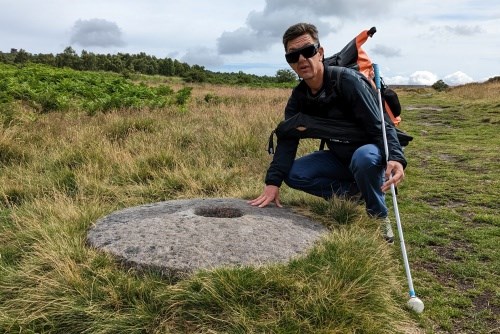Michael Ellis - Rock Skills Intermediate

Michael grew up in Guernsey and after going to university and several years working in England, returned to the island with his young daughter. At the age of 40 Michael’s vision started deteriorating and within four years he was registered severely sight impaired (blind). After struggling through a world that didn’t make sense, at 46 he was diagnosed with autism. He currently works a few hours a month as a climbing assistant and an expert by experience for autism. Michael’s voluntary roles include admin/research for the local LGBTQ charity and various things for disability, autism, sight impairment and equality.
How does your visual impairment and autism affect you day to day?
The phrase that always springs into my head is ‘it is hard work’. My estimate is that most things take about four times as long to do, but then you have to be completely focused throughout. I encourage people to try blindfolding themselves and go through their ‘getting up’ routine – shave, clean teeth, shower, dress, breakfast, medication, dishes – then tell me how they felt! It is a case of being on high alert during any task, whether on a bus or making dinner.
I have learnt to follow energy accounting, which is basically balancing out my weeks and days to allow for time out and not attempting to pack too much into one day, but it is hard to be disciplined sometimes. I was always structured and ordered, so that helps with visual things, but if anything goes wrong or is in the wrong place it is an epic challenge to get past that, and then there is the resulting time and energy spent.
I tend to have shutdowns (that look like I am lost) rather than meltdowns (that look like a tantrum), but I lose my ability to speak and my thinking gets slow and I cannot join the dots. Sensory environments impact a lot – so if walking out and about, you are having to focus on the sounds etc for where you are, but also have to deal with overwhelming smells from cars, people, hedgerows, noises of cars, lawnmowers, people and potentially contact with people either by bumping into them or them grabbing hold to direct you.
I don’t drive, so I need to plan for walking (if I can find a safe route), buses, lifts or taxis. If asking friends for lifts, that entails social interaction and that is hard work. The endless scenarios in my head, just from a simple question on messenger or a Facebook post – it is a big deal.
How and when did you start climbing?
I only really started climbing just under two years ago. I have always been adventurous and active, so have tried various things over the years.
I was referred to the newly established Bailiwick Social Prescribing, which is based on a GP referral for non-medical activity. They connect those offering to provide something with those who need something. They put me in contact with
Climb LBG and it all started from there. Climb was founded to give everyone the opportunity to climb. It was a fairly new charity and they hadn’t climbed with someone visually impaired before – so it was a learning curve for all of us. I was able to have quite bespoke sessions.
After about a year, I started to also access mainstream clubs alongside the inclusive sessions. I have also been able to enter a national competition, climb in Spain, go to an LGBTQ festival and am currently doing a fundraising challenge!

How did you find out about Mountain Training’s Rock Skills courses?
I have completed a few courses now –
Indoor Climbing Assistant,
Rock Skills Intermediate and
Learn to Lead Sport Climbs. The Learn to Lead was an option at the
ClimbOut festival, and best lined up with my experience and skills. The other courses (and originally
Rock Skills Introduction which I had to cancel due to COVID) were in conjunction with Climb. There were five of us who did the Indoor Climbing Assistant together, which then enabled us to assist for the charity.
What did you see as the challenges to be overcome and how did you plan to address them? Did the course provider help?
In the main, it is a case of planning, preparation and awareness.
For costs, I was able to apply for bursaries from Mountain Training and for ClimbOut, and I did secure some sponsorship for other climbing events/promotion from Ravenscroft. I also budget each week to contribute to climbing related costs, including clothing and equipment.
For autism and sight needs, I need to plan travel and set up the right support. If I am away from home, then I need to ensure that I am going to have sufficient space and time out. The latter is important before, during and after the actual course or event. For autism and sight needs on the course itself, it is important to speak beforehand with the instructors and set out needs, concerns, challenges etc. This makes it a lot easier for all concerned, and then on the actual course, any equipment I would touch and feel, and the instructor would describe. It is also important to have discussed my sight guiding instructions beforehand, so that this can be used when actually climbing.
By talking about these things beforehand, then it makes it a lot clearer and easier for me and the instructor.
How was the training course? What were the most valuable things you learned?
This course was Rock Skills Intermediate. The things which really stand out from the course were ‘choose where we are going to climb’ based on a few criteria and setting up abseils. With the latter, I had set up these before but now feel more confident. Generally, I was feeling more secure and confident with seconding, handling equipment and knowing ‘what I should be doing next’.
The selecting a crag/routes was daunting. I had my laptop to look at
UKC online and phone apps which will read out text, so I could use a guidebook. That said, it was extremely longwinded! However, I managed it and it has spurred me into being more engaged with where we are going and choosing climbs. It is something which I need to be doing moving forwards – and I am now able to figure out the best way to access the information. I definitely need to allow a lot of time and energy for the process.

What do you like most about climbing?
There are lots of things I love about climbing. Although I have someone who is sight guiding, I feel like an equal. I am fully participating in the actual climbing and it is down to me when making a move or how I position myself/balance. It is very systematic and has set processes/order for things.
I would also say that it has opened up new friendships! I have got to know a few people and then this has extended into other conversations or actions. I am genuinely interested in what they are up to (which is rare). As well as then climbing with these friends, I am also meeting them or talking to them outside of that.
I feel that people have made a real effort to include me. I am not always easy, especially if getting overloaded or guiding instructions are not going to plan. However, people have definitely really tried.
What advice would you give someone who’s visually impaired who wants to try climbing?
Go for it! There is a freedom when climbing – you are in a harness, with safety precautions, someone explaining where things are and nobody in your path!
There is a lot of trust and communication involved in climbing, and this is intensified for someone who is visually impaired. I think I feel that far more when belaying than climbing – that someone trusts me enough to be in that position.
Be patient when climbing! It is really easy to get stressed or frustrated, but it is a learning curve for everyone. Get in tune with your sight guide on a straightforward route, and make sure that you both know how you will describe things. Then really it is practice and time!

What advice would you give someone who is not visually impaired, who might climb with someone who is visually impaired?
The first thing I would say is to embrace it and enjoy it! There will be fears and unknowns, so try to unravel those at the start. Communication will be key – talk to each other. Each person will be different, so discuss what terms to use, how to describe things, what support is needed getting to the route etc.
Do not panic! It is easy to get flustered, but then everyone just gets increasingly stressed. Route reading and planning is essential. It is easier if someone else is able to belay, so that you are able to move around and not multitask.
It is also valuable for people to have a greater understanding by trying it for themselves – so people can try climbing blindfolded or just try easy daily tasks.